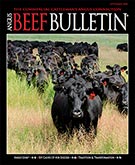A Look at the Economics of Parasite Control
Research and real life support the economic importance of controlling parasites in grazing cattle.
When cattle prices are lower and every input cost is scrutinized, it’s tempting to drop parasite control from the health program to save a little money. However, studies have shown a true economic benefit to controlling parasites.
“Parasite burdens in grazing cattle can decrease efficiency due to decreased appetites and utilization of feed that is readily available,” said Libby Fraser, veterinarian in Beef Technical Services at Zoetis. “When cattle are gathering their own feed, it is important for them to have healthy appetites. That good appetite can often be measured in end-of-grazing-season weight gains.”
A field trial in preweaned grazing beef calves nursing their dams demonstrated a net value advantage for Dectomax® Injectable Solution when compared to LongRange® and a set of control animals that were not treated for parasites.1 Both treated groups received the recommended label dosage of 1 mililiter (mL) per 110 pounds (lb.) of body weight at turnout time in June. The Dectomax group received a second dose in August at the time calves were processed for preconditioning vaccinations. The LongRange group only received the single dose at the beginning of the grazing season as per its label.
While the calves treated for parasites showed a significant (P-value < 0.03) advantage in gain over the control group, there was no difference in gain between Dectomax and LongRange. When the labor costs, the costs of the products and the pounds of gain were all analyzed, the Dectomax group had a net value advantage over the control group of $65.55, while LongRange had a $62.50 advantage.1 Controlling parasites had a true economic benefit in this field trial.
Benjamin Ranch near Silma, Colo., had a similar experience with the products in grazing yearling stocker cattle. Lee Benjamin and his family operate a commercial cow-calf herd of about 250 Angus cows bred to Charolais bulls, as well as grazing yearlings.
Benjamin wanted to see how Dectomax Injectable and LongRange would perform in his grazing yearlings. At the end of a 96-day grazing season, during which he conducted a small side-by-side trial, Benjamin was pleased with the results he had in the yearlings receiving Dectomax.
“Overall, I was really pleased with the health and performance of the cattle receiving Dectomax, and it cost less to administer,” said Benjamin. “When you couple those two together, it makes more sense to me.”
When developing a parasite-control program, work closely with your veterinarian or visit with your Zoetis representative about options available. For more product information, visit www.ZoetisUS.com.

Editor’s Note: This article is edited from a release from Zoetis. Dectomax Injectable has a 35-day preslaughter withdrawal period. Do not use in female dairy cattle 20 months of age or older. Do not use in calves to be processed for veal. Dectomax has been developed specifically for cattle and swine. Use in dogs may result in fatalities.
1 Data on file, Study Report No. 15CAPETBIO01B, Zoetis Inc.






